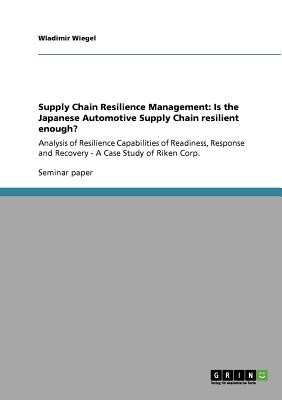
- We will send in 10–14 business days.
- Author: Wladimir Wiegel
- Publisher: GRIN Verlag
- Year: 2011
- Pages: 88
- ISBN-10: 3640849051
- ISBN-13: 9783640849055
- Format: 14.8 x 21 x 0.5 cm, softcover
- Language: English
- SAVE -10% with code: EXTRA
Reviews
Description
Seminar paper from the year 2010 in the subject Business economics - Supply, Production, Logistics, grade: Distinction, University of Manchester (Manchester Business School), language: English, abstract: Since 1980's the Japanese car manufacturing industry has been celebrated as the most efficient car industry in the world regarding production systems and processes. However, on 16 July 2007 this efficiency of the entire Japanese automotive industry was challenged when an earthquake hit the Chuetsu region in Japan and decimated a small but critical portion of its supply chain. Riken Corp., a supplier of automobile engine components such as piston rings, was this critical sup-ply chain bit. Its failure to operate after the event caused a chain reaction of plant closures of the main eight Japanese car manufacturers and parallelised nearly 70 per cent of the world biggest auto production industry. The underlying qualitative study adopts some conceptual supply chain resilience management models available in the academic literature as theoretical lenses to analyze the Riken Corp. case. The main argument of this research paper is that while the Japanese automotive supply chain is capable of delivering an efficient and effective response to and recovery from an interruption, it, however, lacks the capability of event readiness, which is the active resilience preparation for a supply chain disruption.
EXTRA 10 % discount with code: EXTRA
The promotion ends in 7d.16:23:41
The discount code is valid when purchasing from 10 €. Discounts do not stack.
- Author: Wladimir Wiegel
- Publisher: GRIN Verlag
- Year: 2011
- Pages: 88
- ISBN-10: 3640849051
- ISBN-13: 9783640849055
- Format: 14.8 x 21 x 0.5 cm, softcover
- Language: English English
Seminar paper from the year 2010 in the subject Business economics - Supply, Production, Logistics, grade: Distinction, University of Manchester (Manchester Business School), language: English, abstract: Since 1980's the Japanese car manufacturing industry has been celebrated as the most efficient car industry in the world regarding production systems and processes. However, on 16 July 2007 this efficiency of the entire Japanese automotive industry was challenged when an earthquake hit the Chuetsu region in Japan and decimated a small but critical portion of its supply chain. Riken Corp., a supplier of automobile engine components such as piston rings, was this critical sup-ply chain bit. Its failure to operate after the event caused a chain reaction of plant closures of the main eight Japanese car manufacturers and parallelised nearly 70 per cent of the world biggest auto production industry. The underlying qualitative study adopts some conceptual supply chain resilience management models available in the academic literature as theoretical lenses to analyze the Riken Corp. case. The main argument of this research paper is that while the Japanese automotive supply chain is capable of delivering an efficient and effective response to and recovery from an interruption, it, however, lacks the capability of event readiness, which is the active resilience preparation for a supply chain disruption.


Reviews